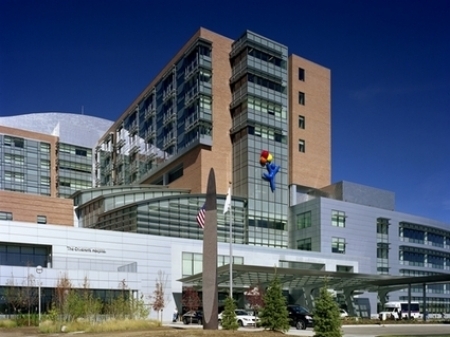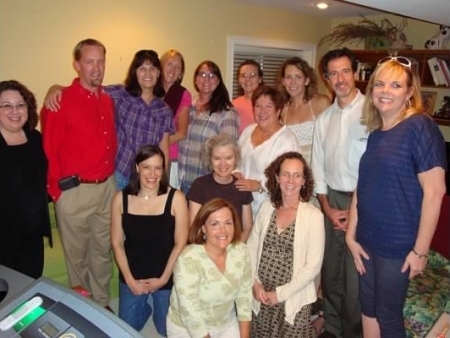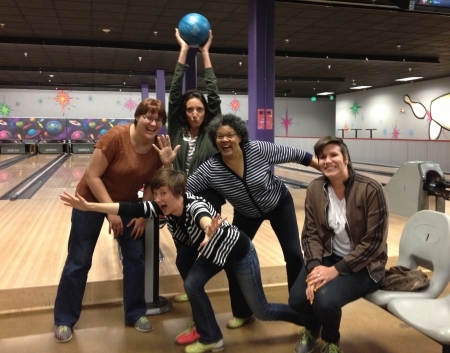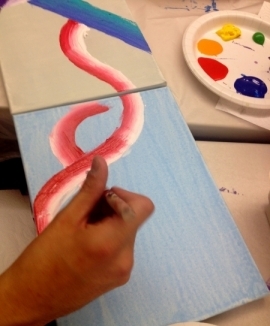Children's Hospital Colorado
Children's Hospital Colorado’s Immunodeficiency Program (CHIP) provides care for HIV-infected children, young adults, and families. CHIP was founded in 1992 to provide comprehensive services to families affected by HIV, and it remains the only program in the Rocky Mountain Region specifically dedicated to providing HIV care and prevention for children, youth, young adults and pregnant women. Our mission is to lead in the provision of innovative, client-centered care, research and prevention programs that improve the health and quality of life for children, youth, young adults, pregnant women and families living with or affected by HIV, or at risk for HIV-infection.
CHIP is affiliated with the National Institutes of Health (NIH) as a research site which assures access to the newest investigational drugs and to the most recent developments in the treatment of HIV disease. The program is a nationally recognized clinical trials site for several distinguished research networks: IMPAACT (International Maternal, Adolescent and Pediatric AIDS Clinical Trials, PHACS (Pediatric HIV AIDS Cohort Studies) and ATN (Adolescent Trials Network). CHIP also provides cutting edge state-wide programs for screening and treating pregnant women with HIV in order to decrease transmission to infants, assist sero-discordant couples wishing to become pregnant, and sponsors the CHIP Youth Project (CYP), the new KNOW program (Knowledge, Network, Opportunity for Women), which is a Women’s Testing Network collaboration of local agencies trained to administer HIV testing for women over age 25, and the HOPE program (Healthier Options for the Parenting Experience), a collaborative project in Denver to provide reproductive counseling services to persons living with HIV, as well as programs that provide prevention, screening, and care to uninfected at-risk youth and women.
Our Staff
CHIP has a multidisciplinary team of over 40 staff dedicated to providing state-of-the-art care that meets the medical, social, psychological, developmental, and nutritional needs of our clients as well as offering research and programs that provide care, prevention, advocacy, and education. Among this skilled, caring, and committed staff, the following people work on the PHACS studies and with our PHACS participants:
Betsy McFarland, MD, CHIP Director, PHACS Site Principal Investigator is one of the founding physicians of the CHIP program, working with the program since 1992. She is the Director of CHIP, the Site Principal Investigator for our PHACS and Adolescent Trials Network (ATN) site, and co-Principal Investigator for our IMPAACT site. She oversees CHIP medical and psycho-social care programs and clinical trials work, and she has the privilege of working with a fabulous team of dedicated, talented people committed to care of and advocacy for people living with HIV. Dr. McFarland provides medical care to HIV-positive children and teens and participates in our mother-to-child transmission prevention activities. She is a member of the PHACS Nutrition, Metabolic and Growth (NMG) Committee and the IMPAACT Cure Committee. She also conducts research investigating HIV-specific immune responses to HIV vaccines, immune-based therapies, and determinants of perinatal HIV transmission. She is excited to work on PHACS studies because it is an opportunity to learn how treatment can be optimized to help people affected by HIV to thrive in all aspects of their lives.
Emily Barr, CPNP, CNM, MSN, Pediatric Nurse Practitioner, Midwife, CHIP Research Studies Coordinator, has been working with families affected by HIV for almost 25 years, and has been with CHIP for 14 years working with HIV infected and affected children, HIV+ adoptees, youth and pregnant woman. Emily oversees the CHIP research program and serves at study coordinator of the PHACS, IMPAACT and ATN grants. Emily serves on several national committees for the PHACS and IMPAACT networks, and follows CHIP patients including PHACS study participants. Emily also enjoys teaching a birthing class for HIV + pregnant women and works as a medical advisor to Camp Round Up River Ranch, a camp in the Rockies for families affected by HIV. Emily is drawn to working on the PHACS studies because she feels that following our HIV-infected and exposed children and young adults over time is a critical piece of understanding the long term medical and psychosocial effects of both living with HIV disease and of the medications we use to treat HIV.
Carrie Chambers BSN, RNC, Clinical Research Nurse Coordinator has been a nurse since 1997 and has had the privilege of working as a clinical research nurse with CHIP since 2009. Currently, she conducts all the SMARTT, AMP, and substudy study visits for PHACS. Carrie also helps oversee and participates in our site PHACS CAB and Youth CAB, and she serves on the PHACS national Scientific Leadership and DMC working group committees. She is knowledgeable in HIV care and treatment, and has a dedication, commitment and passion to furthering research in pediatric, adolescent and maternal HIV care.
Juliana Darrow, MPH, Professional Research Assistant joined CHIP in May 2013. Juliana works primarily on the AMP study and its substudies and with the Static cohort of the SMARTT study. She is excited to be part of the working world after being in school for 6 years completing her undergraduate degree in Integrative Physiology, Master’s degree in Public Health, and internships at the CDC and Colorado Department of Public Health. Juliana is excited to be a part of the HIV research world and to be part of the CHIP team! She is enjoying learning about the different aspects of clinical research and working with CHIP patients and families.
Jenna Wallace, MSW, Professional Research Assistant has been with the CHIP Research team since June 2010. She works on a variety of research projects at CHIP, in particular with the Dynamic cohort of the SMARTT study. Jenna has a passion for working on studies for pregnant women and their infants. She has loved working with the team and patients at CHIP and learning about the many different aspects of research and our clinic. Jenna also loves data and data management, and sits on the national DMC working group committee.
Alisa Katai, MHA, Senior Professional Research Assistant has worked in HIV/AIDS/STI research, provider training, and program development and administration for 17 years, and been with CHIP as a senior research assistant since 2009. On PHACS, Alisa’s work currently focuses primarily on regulatory management, quality assurance, and administration, and she sits on the MDC substudy national working group committee. Alisa has an ongoing passion for being part of HIV research, a commitment to furthering programs and research that provide care, prevention, and increasing knowledge in the fight against HIV, and loves doing this with PHACS and other research programs at CHIP.
Robin McEvoy, PhD, Neuropsychologist is the CHIP team neuropsychologist for the federal research protocols. She is a founding member of CHIP, on the team since 1992. Her role on PHACS is the collection of different kinds of research data about a child's development, including memory, thinking, language, and academic skills, general emotional health, and ability to be independent. The data is used to evaluate how well the different treatment approaches are working. Dr. McEvoy is also available to assist our families when they have concerns about their child’s development or academic progress. In her time here, Dr. McEvoy has seen huge progress in the care and outcomes for children and youth who are HIV infected. It has been extremely gratifying to watch so many children growing into adults, pursuing great careers and creating their own healthy families. She obviously loves working on the team because she has been here for 22 years, however her hair is now gray.
Jennifer Dunn, MSN, FNP-BC, Family Nurse Practitioner has been with the CHIP program since 2008 as a Family Nurse Practitioner working with patients across all ages including pregnant women, HIV-exposed infants, international adoptees & refugees, perinatally infected youth and high risk youth. Jenn is a provider for our participants on research protocols including the PHACS studies. Jenn values the unique role that HIV providers play in her patients’ often complex lives.
Suzanne Paul, MSN, FNP-C, Family Nurse Practitioner has been with CHIP since 2001 as a FNP, working primarily with our HIV + patients from birth through adulthood and with pregnant patients. She is the provider for a number of our participants on our research studies and enjoys working with families when they enter clinical trials and following them on trials. Suzanne speaks fluent Spanish and enjoys working closely with the research team on protocols.
Kay Kinzie, MSN, FNP-BC, Family Nurse Practitioner, CHIP Clinical Manager joined CHIP as a Family Nurse Practitioner in 1999. She served as Pregnancy Coordinator until 2009, and is currently the CHIP Clinical Manager. Kay has had more than 34 years of nursing experience in a variety of settings, the last 17 of which have been as a Nurse Practitioner. In addition to her role as Manager, Kay follows a caseload of patients, including a number of women and their babies on the Dynamic SMARTT study.
Jessie Robinson, MS, CHIP Clinical Research Manager joined the CHIP team in 2011 as the Clinical Research Manager. Jessie has spent the last 15 years in research management, with the last 7 years focused on clinical pediatric research. At CHIP Jessie is the research manager overseeing the day-to-day details of our research activities and research team for all three research networks including PHACS. She is thrilled to have ultimately landed at CHIP, where her passion of bringing more knowledge to the world of HIV prevention and care is shared across an incredibly dedicated team.
Mark Abzug, MD has been a founding physician of the CHIP program since 1992. He has been an active participant in multiple pediatric HIV networks, with interests that include vaccine responsiveness as a measure of immune function and in complications of HIV infection and its therapy. Dr. Abzug follows several of patients on the AMP study. Dr. Abzug appreciates the opportunity to contribute to the care of HIV-infected children and to advance research important to their lives.
Susan Mahoro, BA in Education, HCT, BSN student, Research Assistant, is the newest member of the CHIP team, joining us in November 2013 as a research assistant and nurse student providing care to postpartum mothers and their babies at Denver Health Medical Center who are enrolled on the SMARTT study. Susan is inspired to work with a great group of diverse professionals with a passion to find answers to some of the hard questions surrounding HIV/AIDS. We are excited to have Susan on our PHACS team!
Adriana Weinberg. MD oversees the medical care of the HIV-infected pregnant women in the CHIP Perinatal Transmission Prevention Program, including following HIV-infected pregnant women who join the Dynamic SMARTT study. She started working with CHIP as a founding physician in 1993. Dr. Weinberg also helped organize CHIP’s HOPE program and has been providing pre-conception counseling to HIV-affected couples since 2003. Dr. Weinberg has a strong research interest in HIV infection and is part of the leadership of the IMPAACT and ACTG research networks. She also enjoys working with pregnant women and affected couples to prevent HIV transmission.
Our CAB
CHIP’s CAB is a very supportive community. The CAB is a great environment for learning, programmatic feedback, outreach, advocacy and community. The group is very open to new members from all different backgrounds and makes sure that new attendees feel welcome. This group has been the largest source of support for women living with HIV for quite some time and therefore has a great reputation in this community. It feels like a community because no matter what, we are there to support each other, help each other and make a difference.
In addition to the CAB, CHIP also has a Youth CAB to provide youth in our programs a comfortable environment that feels safe to voice their crucial perspective and input to our clinic, programs and research, and they also participate with the broader CHIP CAB. In addition, two of our PHACS youth subjects are active on the national PHACS Youth CAB phone conferences.
Some of our CAB’s recent activities include hosting a bowling event, we had a meeting to discuss criminalization of HIV and how that will and does affect the women and children in our program, and of course we have reviewed research protocols and medical advances around HIV.
We find that the most helpful resource our CAB has is speaking with people out in the community regularly about what is happening specifically in the HIV/AIDS community. We also live by the mantra, “if you feed them, they will come” and it certainly seems to work well here!
What tip can your site share on how to make a study visit run smoothly?
Schedule study visits in advance, and Prep Prep Prep… We keep a tracker that carefully tracks the study visit windows for each study patient and we start trying to schedule patient visits at the beginning of their windows, rather than waiting until they show up for a clinic visit. We keep a check list of everything that is needed at the study visit, and make sure we have everything we need and are aware of previous triggers, so that we don’t miss evaluations or information we need to collect at the visit. And families do best if they are also prepared before they arrive for what the study visit will entail and how long it will take, so they aren’t surprised and need to leave a visit early before we are done.
How does your research team make study visits comfortable for families?
We develop a rapport with families, we try to anticipate needs, and for blood draws we use EMLA cream and a child life specialist to make it the best experience possible. Also, children get to go to the “prize” closet at the end of the visit.
Please share a valuable contribution one of your participants has made to improve your site.
We did a disclosure workshop for mothers who wanted information on disclosing their HIV status to their maturing HIV-negative children. We had three mothers from our CAB tell their stories on disclosure. We also have a CAB member who puts together a quarterly newsletter for our program.
What are some special events your clinic has held in the past?
CHIP holds, sponsors, participates in, and provides expert clinical staffing for numerous special events and activities regularly throughout the year for patients of all ages, including age- and cohort-specific empowerment events, educational, fund-raising, and social/recreational events, workshops and classes, summer camps, and celebrations and other “self-care” activities for patients, staff, and for the CHIP program overall.
Events with patients and in the community have included: childbirth education classes for HIV+ pregnant women; facilitating a training for the With Women Doula organization; a Transition Workshop using games and group activities to review skills and knowledge youth need to transition to adult care; a CHIP Youth Program Day of Wellness, featuring “Art from Ashes: Empowering youth through creative expression and personal transformation”; an annual or summer/winter outdoors weekend sponsored by Challenge Aspen (i.e., a camping/river rafting/ropes course weekend for young adult HIV+ women or a skiing weekend for boys age 12-16); a Tweens Group weekend, an annual event for HIV+ boys or girls ages 9-14; Round Up River Ranch Camp for children with special medical needs, and a Family Camp for families affected by HIV; testing and outreach at Denver’s annual Pride Festival; an annual Art Day for children and staff who spend a day painting, drawing, sculpting, decorating, and creating art in a variety of media that is then presented and auctioned at the Telluride AIDS Benefit (TAB) every spring of which CHIP is a beneficiary; a school-based educational event in Telluride; the annual Pool Party in the summer; an educational and social gathering for families with adoptive HIV + children; a joint staff/patients team that fundraises and walks at Colorado’s annual AIDS Walk, and numerous speaking and training sessions for medical and social work/social service professionals and students throughout the region.
CHIP staff enjoy a variety of trainings and workshops, social events, mini-competitions and other activities throughout the year, which include participating with our patients in many of the events listed above, as well as a birdhouse decorating contest as part of Art Day and birdhouses then donated to the TAB art auction in the spring, a Spring Fling “white elephant” gift exchange luncheon, a single-elimination staff game of Clue in the summer, a highly competitive game of guessing the date of the first full snow-fall of the season (includes a prize and constantly changing creative set of rules for deciding the winner); potluck holiday celebrations including a hilarious Secret Snowman week of tiny gifts, gag gifts, and surprise flashmob cubicle decorating at the end of the year; as well as happy hours to welcome new staff, say goodbye, or “just because we’ve been so busy”; potluck baby and wedding showers; and staff inservices and lunch-and-learns a few times a year on a wide variety of topics such as general advances in HIV care and research, a-day-in-the-life presentations by staff and other communication-enhancing team-building sessions, staff “self-care” techniques, and lessons in Advanced Excel, as well as the annual Research Team Retreat (which last year featured a Zombie Apocalypse activity).









